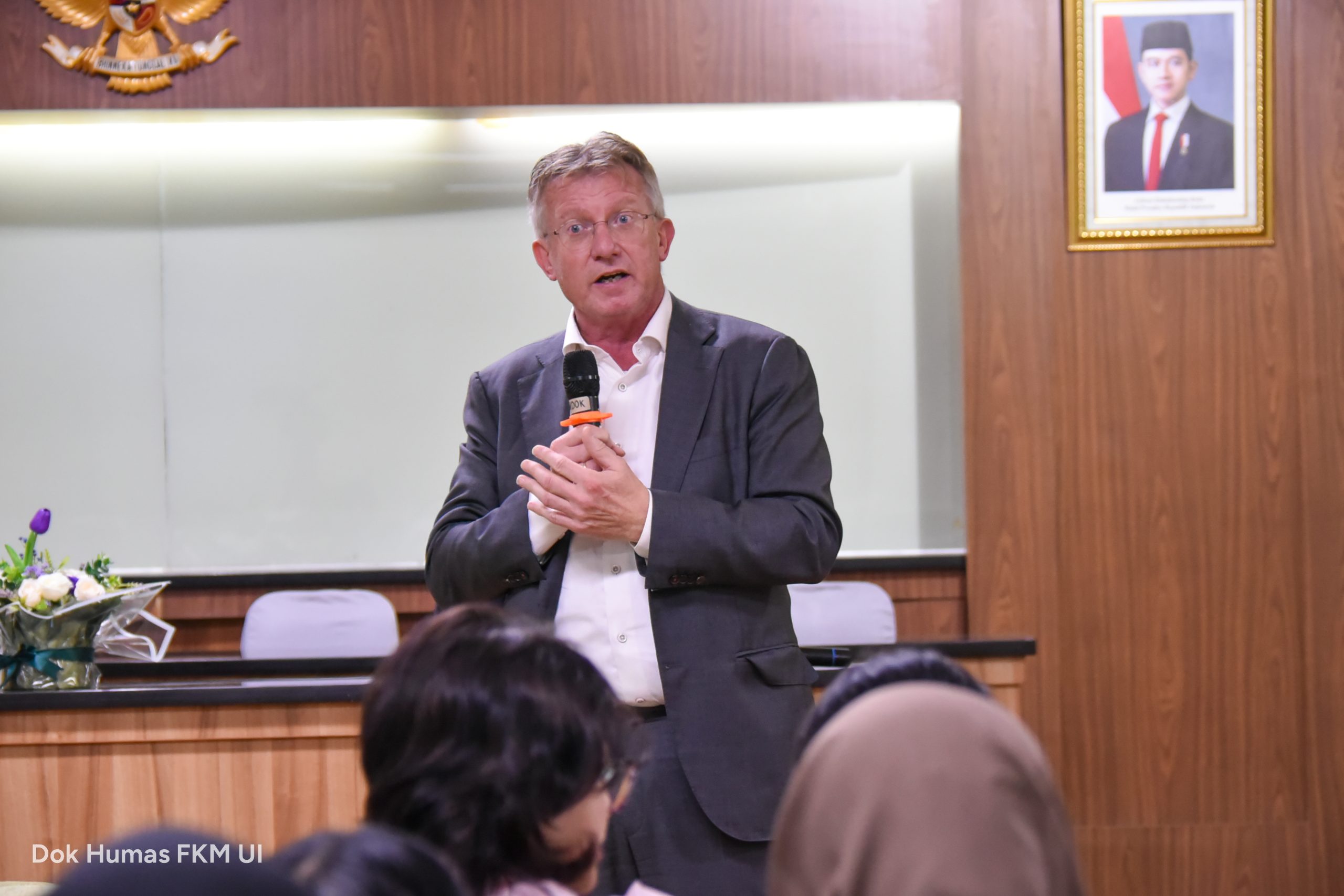Depok, October 9, 2025 – The Faculty of Public Health (FPH) Universitas Indonesia (UI) continues to strengthen its role as a center of excellence actively building global academic networks. As part of this effort, FPH UI, in collaboration with Leiden University Medical Center (LUMC), the Netherlands, held a guest lecture titled “The Essential Role of Primary Care for Effective Population Health Management” on Thursday, October 9, 2025, at the Doctoral Promotion Room, FPH UI, Depok.
The event featured two distinguished speakers from LUMC: Prof. Dr. Marc Bruijnzeels, Ph.D., Professor of Population Health Management and Educational Director of the Master of Population Health Management program, and Dr. Martijn Sijboom, Ph.D., Assistant Professor of Population Health Management. The lecture was moderated by Dr. Fathimah Sulistyowati Sigit, M.Res., Ph.D., Head of the Department of Nutrition, FPH UI, and officially opened by Prof. Indri Hapsari Susilowati, S.K.M., M.K.K.K., Ph.D., Manager for Partnerships, Alumni Relations, and Ventures at FPH UI.
In her opening remarks, Prof. Indri expressed appreciation for the presence of the speakers from LUMC and emphasized the importance of international academic collaboration in enriching scientific perspectives in the field of public health.
“The topic of this guest lecture is highly relevant amid global health system challenges that demand services to be equitable, accessible, promotive, preventive, and sustainable. In this context, primary health care serves as the cornerstone for maintaining community health and improving population well-being. FPH UI is committed to being a space for scientific dialogue that bridges knowledge, policy, and practice in public health. Through this lecture, we hope to deepen understanding of how strong primary care systems can enhance population health management and reduce health disparities. We encourage all participants to engage actively, ask questions, and share ideas so that this session becomes a fruitful platform for knowledge exchange contributing to public health development in Indonesia and globally,” said Prof. Indri.
In his presentation titled “Exploring the Essential Role of Primary Care for Effective Population Health Management”, Prof. Marc Bruijnzeels began by introducing the Dutch healthcare system, which places primary care as the foundation of its national health system. He emphasized that primary health services play a crucial role in ensuring accessibility, continuity, and effectiveness of care for all citizens.
Prof. Bruijnzeels also highlighted the epidemiological transition and the increasing complexity of chronic diseases, particularly in developing countries with aging populations. He noted that current health systems often operate in silos or fragmented structures, limiting their impact on population health. Therefore, he advocated for new approaches focusing on value-based healthcare and Population Health Management (PHM).
PHM was described as a people-centered, data-driven, and proactive approach to managing the health of specific population groups by considering social and health determinants. In this model, populations are categorized based on risk levels, needs, and potential impact of interventions. This allows for more efficient allocation of healthcare resources and more targeted interventions. “Primary care is both the starting point and the connecting link between communities and the health system. A population-based approach enables us to target the right interventions to the right groups at the right time,” he explained.
Meanwhile, Dr. Martijn Sijboom discussed the complex challenges faced by modern healthcare systems, both in the Netherlands and Indonesia, such as demographic changes, the rise of non-communicable diseases (NCDs), and limited resources. He underscored the importance of interprofessional and interdisciplinary collaboration to address these challenges.
“Not all health problems can be solved by doctors alone. An interdisciplinary approach—engaging multiple fields and health professionals—is key to effectively managing population health,” said Dr. Sijboom.
Through this guest lecture, participants gained a deeper understanding of Population Health Management (PHM)—a people-centered, data-driven, and proactive framework for improving overall population well-being. The discussion covered the PHM cycle, from population identification and risk assessment to segmentation, intervention design, and continuous evaluation.
The session also explored the relevance of implementing PHM in Indonesia, particularly in strengthening primary care systems for the prevention and control of chronic diseases such as diabetes and hypertension. The speakers shared research findings demonstrating that improving the quality of primary care services can significantly enhance the effectiveness of health systems overall.
The guest lecture was attended by members of the FPH UI academic community, including students, lecturers, and researchers, who actively engaged in discussions about the local application of PHM in Indonesia.
Through this academic exchange, FPH UI reaffirms its commitment to expanding global academic collaboration and enriching the scientific insight of its academic community in pursuit of a more effective, equitable, and community-oriented health system. (wrk)

